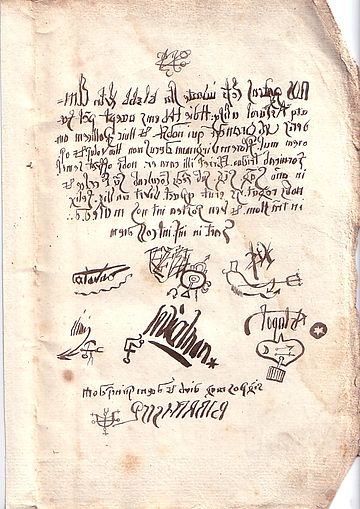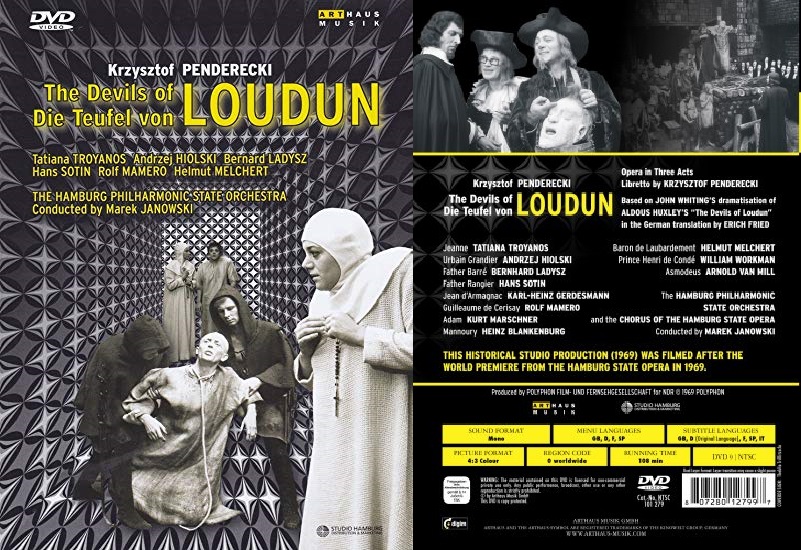Some random notes:
I was looking for more modern operas to watch after I rewatched Wozzeck and Lulu on DVD recently. The performance of the reduced arrangement of Ligeti’s opera Mysteries of the Macabre rekindled my research.
Opera by Krzysztov Penderecki, written 1968-1969, about religious mass hysteria that occurred in 1634 in Loudun, France. The priest Urbain Grandier was accused of seducing nuns and witchcraft. This historical event, known as the Loudun Possessions, has gone through several modern, fictional tellings that lead to Penderecki’s opera:
- The 1952 novel The Devils of Loudun by Aldous Huxley
- The 1960 play The Devils by John Whiting, adapted from the Huxley book
- The 1968-1969 opera Die Teufel von Loudun by Krzysztov Penderecki
- The 1971 movie The Devils by Ken Russell (with Vanessa Redgrave and Oliver Reed!) [ IMDB | Rotten Tomatoes ]
Other, earlier representations (listed here):
- The 1700s book The Cheats and Illusions of Romish Priests and Exorcists Discovered in the History of the Devils of Loudun by historian Nicholas Aubin.
- The 1840 book Crimes Célèbres, Volume 4, and the 1840 play Urbain Grandier by Alexandre Dumas
- The 1862 book La Sorcière by Jules Michelet has a chapter on it.

(Related: On my copy of Girl Boss: Revenge, there are four trailers for films from the same distributor. One film is The True Story of the Nun of Monza. A salacious tale about indiscreet nuns, taken from an actual historical event about The Nun of Monza who had illegitimate children and murdered another nun. I had commented then that the story would be a great opera. The intersection of the softcore trash of The True Story… and the astringent style of Penderecki is probably how Russell’s movie plays.)
I found one available edition of the study score for the opera at Stretta Music for 63 Euros. Tempting.
There is a performance of the opera (1:47:53) produced for TV in 1969 with the same cast as the premiere that was performed earlier that year in Hamburg. The video uses several camera effects and looks, as would be expected, a little dated.
Philharmonische Staatsorchester Hamburg and Hamburgischen Staatsoper, conducted by Marek Janowski, video directed by Konrad Swinarski. It is a copy of the DVD published by Arthaus Musik: “This historical studio production (1969) was filmed after the world premiere from the Hamburg State Opera in 1969”.

Credits taken from the end of the film:
- Tatiana Troyanos – Jeanne, Priorin der Ursulinerinnen (the Ursulines)
- Cvetka Ahlin – Schwester Claire
- Ursula Boese – Schwester Louise
- Helga Thieme – Schwester Gabrielle
- Andre Hiolski – Urbain Grandier, Pfarrer an (minister of) Saint-Pierre
- Bernard Ladysz – Pater Barre
- Hans Sotin – Pater Rangier
- Horst Wilhelm – Pater Mignon
- Ernst Wiemann – Pater Ambrose
- Karl-heinz Gerdesmann – Jean D’Armagnac
- Rolf Mamero – Guilleaume de Cerisay
- Franz-Rudolf Eckardt – Gerichtsvorsteher (warden)
- Krut Marschner – Adam, Apotheker (pharmacist)
- Heinz Blankenburg – Mannoury, Chirurg (surgeon)
- Helmut Melchert – Baron de Laubardemont
- William Workman – Prinz Henri de Conde
- Carl Schultz – Bontemps, Kerkermeister (dungeon master)
- Arnold van Mill – Stimme des Asmodeus (voice of Asmodeus)
- Ingeborg Krueger – Philippe Trincant
- Elisabeth Steiner – Ninon, eine junge Witwe (a young widow)
The Ken Russell movie was as controversial as any of his. Russell got Peter Maxwell Davies to compose the soundtrack after hearing his song cycle Eight Songs for a Mad King (1969). That piece is a veritable catalog of avant-garde technique and notation (and a bit difficult to say the least, how does a baritone even get through such a performance?). The score is beautiful. It uses the writings of (mad) King George III as the source material, with a performance culminating in him destroying, Townshend-like, the violin player’s instrument. The music is postmodern, pastiche. A performance is as much theater as music.
Here’s an interview about the movie with Oliver Reed by the famous talk show host Michael Parkinson in episode 2.35. Also on the panel: Isobel Barnett, and Mickey Spillane and his second wife, nightclub singer Sherri Malinou. Best comment from the YouTube comments: “Oliver Reed is great and his lapels are even better.” Parkinson’s interview show looks fascinating!